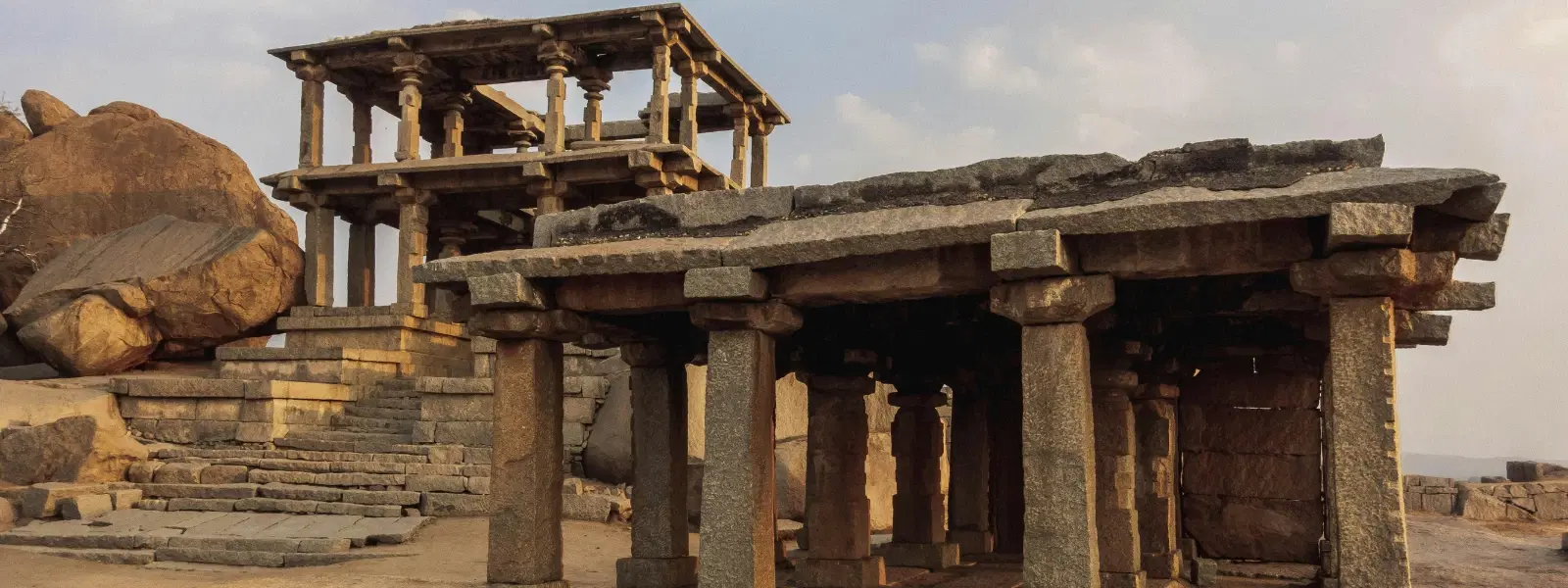
Flights
•04 min read

Mandu, often celebrated as the "City of Joy," enthralls travelers with its rich legacy and architectural maestrory. Nestled in Madhya Pradesh, this ancient city is a treasure trove of ruins and cultural landmarks that promise an unforgettable journey into the past. This blog post answers frequently asked questions about the Mandu historical ruins tour MP, offering practical advice and insights to help you plan the perfect visit to this historical marvel.
Mandu stands as a testament to centuries of history. Recognized as a potential UNESCO World Heritage Site, this ancient city has been an influential cultural center. The ruins, such as the majestic Jahaz Mahal, the graceful Rani Rupmati's Pavilion, and the iconic Hindola Mahal, mirror the glory of its past and continue to inspire those who wander its grounds.
Mandu's architecture is a splendid fusion of Afghan, Mughal, and Hindu design influences. Intricate carvings, sophisticated water systems, and brilliant engineering feats are evident throughout the ruins. These elements not only highlight artistic excellence but also underscore the innovative spirit of an era that continues to capture the imagination of historians and travelers alike.
The ideal seasons for exploring Mandu are during the monsoon and winter months. Monsoon (July-September) transforms the landscape into lush greenery, while winter (October-February) offers a cool, pleasant climate for leisurely sightseeing. These seasons allow you to fully appreciate the charm of Mandu without the discomfort of extreme weather.
Reaching Mandu is straightforward. The nearest major airport is in Indore, while prominent railway stations and well-maintained roads, including NH52, link Mandu to other parts of Madhya Pradesh. Once there, local transportation options such as auto-rickshaws and taxis ease travel between historical sites.
For an immersive experience, consider a one-day or two-day tour based on your interests. A day trip can cover the main attractions, while a two-day itinerary allows time to explore hidden gems and soak in the local culture at a more leisurely pace.
Mandu is synonymous with history and grandeur. Explore renowned sites such as the Jahaz Mahal (also known as the Ship Palace), the graceful Rani Rupmati's Pavilion, and the elegant Hindola Mahal (Swing Palace). Additionally, the stately Hoshang Shah's Tomb and the evocative Baz Bahadur's Palace further illustrate the era's magnificence.

Beyond the famed monuments lie Mandu's lesser-known treasures. Discover the charming Champa Baoli, the mysterious Taveli Mahal, and the serene Jain Temples. These spots offer a more intimate look at the city's layered history and provide perfect quiet retreats away from the more frequented paths.
Cultural heritage is deeply interwoven within Mandu's landscape. Iconic landmarks such as the Jami Masjid and Ashrafi Mahal not only capture architectural brilliance but also narrate tales of the city’s vibrant past and the communities that shaped its identity.
Be sure to check updated information on entry fees and timings before your visit. Ticket prices vary for Indian and foreign tourists, with concessions for children and groups, and some sites may offer special passes for a seamless touring experience.
Prepare for your journey by packing essentials such as comfortable walking shoes, sunscreen, a water bottle, and a camera to capture every detail of these fascinating ruins. Staying equipped will allow you to focus on soaking in the heritage of Mandu without worrying about the logistics.
While visiting Mandu, indulge in local delicacies that reflect the region’s culinary heritage. Accommodation in and around Mandu ranges from simple guesthouses to comfortable stays, designed to add to the authentic travel experience without excess frills.
Both guided tours and self-guided exploration have their merits. A guided tour can provide rich historical context and compelling narratives behind each ruin, while exploring on your own allows for flexibility and personal discovery. Audio guides and tour apps also present excellent alternatives for independent travelers.
Photography enthusiasts will find Mandu a playground for stunning visuals. Capture the golden hues of sunrise at Rani Rupmati's Pavilion, or the mirror-like reflections at Jahaz Mahal. Each corner of Mandu offers a unique frame waiting to be immortalized.
-95e61ea7-ab4c-459c-9b20-5d183cfc507b.png&w=3840&q=75)
As you explore these ancient ruins, remember to travel responsibly. Respect the sites, avoid littering, and support local businesses. These simple actions ensure that Mandu’s rich history is preserved for future generations while providing an authentic experience for every visitor.
The Jahaz Mahal was designed to resemble a ship floating on water, symbolizing Mandu's grandeur during the reign of Sultan Ghiyas-ud-din Khilji.
Entry fees vary for Indian and foreign tourists, with discounts available for children and groups. Please check the official tourism website for the latest updates.
The best time to visit Mandu is during the monsoon (July-September) for lush greenery or in winter (October-February) for a comfortable climate.
Mandu is approximately 100 km from Indore. Options include hiring a taxi, taking a bus, or driving via NH52.
Yes, guided tours are available and they offer valuable insights into the historical context and architectural elegance of the ruins.
Key attractions include Jahaz Mahal, Rani Rupmati's Pavilion, Hindola Mahal, and Hoshang Shah's Tomb.
Mandu captivates with its fusion of rich history, stunning architecture, and cultural splendor. Whether you are a spontaneous wanderer seeking budget-friendly adventures or a seasoned planner looking for a well-organized historical tour, Mandu offers an immersive experience that transcends time. With a blend of celebrated spots and hidden gems, the city remains a perfect destination for history enthusiasts and travelers alike.